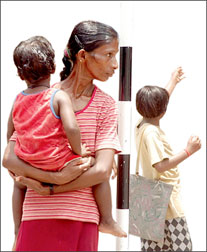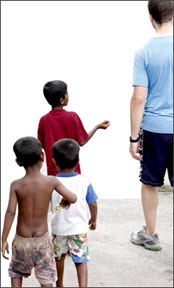Street Children
Unwitting accomplices of a lucrative business:
By Sajitha Prematunge
[email protected]
A teacher at a school in Aluthgama came home to find her two year old
child missing, along with the servant. The police found the child in
Ratnapura town a few days later, entrusted to a beggar, who claimed that
the child was bought, from the servant, for the purpose of begging.
 Using children for begging has been a lucrative business - as this
story suggests - as far back as 20 years ago, perhaps even beyond. Using children for begging has been a lucrative business - as this
story suggests - as far back as 20 years ago, perhaps even beyond.
From drug pushers, pimps and child prostitutes to porters and general
helpers, Street children would do virtually anything for a few bucks.
They fall prey to opportunistic adults who force them to sacrifice their
childhood, in search of wealth.
In spite of the sad reality that street children are used by every
adult around them, including their own parents, it’s hard to see through
that seemingly picture perfect well-knit family. It is hard to determine
whether their parents or guardians are telling the truth, when the
children can’t speak for themselves.
Nilanthi, who has three kids to feed and a husband who refused to
support them, claims that they have been on the street since last year.
Although there was no way of cross checking her story of how they
lost their home in Moratuwa, for the tsunami and how her in-laws then
threw her and her three children on the street, it was a heart warming
sight to watch Asitha, her two year old child armed with a bottle of
milk hitting Wasana - the eldest - on the head. Nilanthi explained that
she has to support her husband as well with the money she earns through
begging. But we were surprised to hear that she earns approximately Rs.
1000/= a day by begging.
Some others were understandably less open and simply refused to talk
to us. A cobbler-grandmother, with an air of indignation refused to give
out any information or be photographed since it would be a disgrace for
her grandchildren who were schooling. In spite of living on the street
they still had a sense of self-esteem.
However Thushari Damayanthi begging with her baby Iruni Madhushani,
was more than willing to talk to us. She had in her possession a letter,
testimonial of her and her husbands plight, who was born with asthma and
later had to have his leg operated on due to a sever accident. He is now
apparently refined to beg near the Kelaniya station near their house.
She said that they earn only around Rs 200/= a day.
Fathima who was languishing on the grass of Viharamahadevi Park with
her family, although a bit reluctant at first agreed to speak to us,
telling her year old boy to put on a pair of pants, in vain, While one
of her daughters - Nithna, played peek-a-boo with me over the grill.
Fathima said that although they do have a rented house in Maligawatta,
they prefer to come to the park and rest during the day. She claims that
her husband is a labourer and that they are just regulars at the part
and do not beg, but are more than happy if and when offered. “We never
take unless it’s given to us.”
There was no way of telling that her older girl - Suliyan, is the
monitress of the class or that she comes first in class every year - as
Fathima claims.
Chief Inspector Buddhika Ratnayaka, Childrens and Womens Bureau said
that using children for begging as a business as well as any other
source of employment, is a punishable offense.
“Under Section 28 of the 29th amendment of 1998 Penal Code, using the
labour of children below the age of 18 is cause for a five year
imprisonment.”
 He further explained that street children are mostly used for drug
trafficking. Most people who are addicted to drugs use kids as drug
pushers or as objects of exploitation for money to obtain drugs. “Most
street children are exploited by their parents or close relatives.” He further explained that street children are mostly used for drug
trafficking. Most people who are addicted to drugs use kids as drug
pushers or as objects of exploitation for money to obtain drugs. “Most
street children are exploited by their parents or close relatives.”
“Street children are a national problem.” He explained that it’s easy
enough to order every OIC to catch all the street children, if only
there were enough places to house them in. “All childrens homes in
Colombo are full.” Consequently he said that they don’t carry it out as
a regular operation.
The OIC explained that most people as well as NGOs and even judges
oppose putting children in chidrens homes. Their argument is that
children - even street children - should not be separated from their
parents. In homes they may receive the necessary education, health care
and comforts, but they are deprived of parental love.
Although the OIC agreed that there may be some truth in this he
claimed that these children, left to their own devices, will some day
become a burden and perhaps even a threat to society.
“They literally don’t have a culture, they are not educated properly
and a good many of them may turn into criminals at the end.” However he
agreed that in order to elevate the living conditions of the children,
foremost the living standards of their parents should be uplifted.
Jagath Wellawatta, Chairman, Child Protection Authority, said that
not all ‘street children’ are on the street at all times. They live in
shanties in the city periphery, in areas like Wanathamulla.
They engage in criminal or illegal activities. As a result a sub
culture has formed, that is psychologically unhealthy for a child to
live in. Due to prostitution, most children born in the areas are
illegitimate and therefore are neglected. As a result they seek comfort
from street life.
“The money earned by the parents or guardians are not spent on child
welfare. Consequently the children attempt to earn money for themselves.
As a result they resort to illegal means.” Other adults may take this
opportunity to employ cheep child labour for illegal operations.
The Chairman explained that, in spite of various attempts by INGOs,
NGOs as well as Government institutions, to establish orphanages and
childrens homes, these have failed miserably. At another time Social
Services in collaboration with the police have arrested children and
produced them at courts.
None of these have achieved the desired end results. Jagath
Wellawatta identified the problem saying “Street children are not the
illness, they are just the symptom. We have to remedy not the existence
of street children, by trying to devise methods of taking them off the
streets, but remedy poverty that brought them there in the first place.”
He further said that they have to conduct attitude changing
programmes. Some street chidren go to school but not regularly.
In the evening or on days they do not attend school, they go to
garbage dumps, in search of polythene, plastic and other collectable
material that will be some source of income. A 100% school attending
programme has been approved and will be launched next year by the Child
Protection Authority in collaboration with the Ministry of Child
Development and Women Empowerment.
“Our objective is to encourage street children to attend school by
giving them necessary support, provided that they make an effort to
improve their level of education.”
He believes that this would be a good example for others in their
society to follow and facilitate a significant attitudinal change.
Shamini Attanayaka, Lecturer in Social Work, National Institute of
Social Development, agrees with this view, saying that their guardians
should be informed of the importance of educating their child.
She believes that socialization is the most significant factor that
influence the lives of street children. In a study conducted by the
National Institute of Social Development in 2006, it was discerned that,
out of the 1523 interviewees, 10.3% were below the age of 18. Boys
clearly outnumbered girls in the street. While the percentage of them
attending school were very low, 24.13% were drop outs and 58.62% have
never been to school.
“As social workers we don’t recommend institutionalization.” said
Shamini reenforcing what the OIC said. She reiterated the fact that they
should ‘work with children’. Shamini claimed that social work should
focus on identifying the childs skills and capabilities and attempt to
develop them.
However is attempting to help street children by educating them
practical? Although Shamini is aware of its practical difficulties, she
thinks that with a little bit of effort this would be of immense
favourable consequences in the long run. “We should bring them ‘under
one roof’ so to say and assess their capabilities.”
“We find jobs for the parents and a house for rent and provide half
the rent until they are capable enough to stand on their own. And we
enrol the children in schools.” For those who are not fortunate enough
to receive such grants, there are ‘Day care centres’ and montessories,
where they can spend their day and leave by night.
Shamini explained that these have been established to prevent
children from becoming drug pushers, pimps and child prostitutes, while
they also educate the guardians on how to protect the children on the
street.
In spite of the belief that guardians exploit their own children for
financial purposes, Shamini says that there is a discernable conversion
of attitudes after the guardians are educated.
“Even beggars believe that their children should not be forced to beg
like themselves.” She says that, since the initiation of such programmes,
using children for trafficking and the like, has lessened. Street life
often makes children aggressive, disobedient and unapproachable. Their
physical as well as psychological needs are totally neglected on the
street.
Working in groups as well as attending to every childs physical as
well as psychological needs are among the best and most effective
methods used by the National Institute of Social Development.
According to Shamini the children who finish their education have a
greater potential of being self sustained and show greater capacity to
solve their own problems. Shamini claims that after giving them a chance
at a good education - which until then was much desired but unattainable
- their behaviour changes dramatically. “Even their language shifts from
the ‘street language’ to the socially accepted.” |
